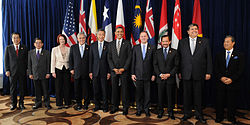Khòa Thài-pêng-iûⁿ Ha̍p-hóe
Khòa Thài-pêng-iûⁿ Ha̍p-hóe (Trans-Pacific Partnership) sī Thài-pêng-iûⁿ sì-ûi 12 kok só͘ thê chhut ê bō͘-e̍k hia̍p-tēng. Chhōa-thâu ê 4 kok sī Brunei, Chile, Niú-se-lân kap Sin-ka-pho, chho͘-kî ka-ji̍p hia̍p-gī ê kok-ka koh ū Australia, Canada, Ji̍t-pún, Má-lâi-se-a, Mexico, Peru, Bí-kok kap Oa̍t-lâm.
 Leaders from 10 of the 12 prospective member states at a TPP summit in 2010 | |
| Type | Trade agreement |
|---|---|
| Drafted | 2015 nî 10 goe̍h 5 ji̍t[1][2][3] |
| Signed | 2016 nî 2 goe̍h 4 ji̍t |
| Location | Auckland, New Zealand |
| Effective | Not in force |
| Condition | Ratification by all original signatories, or (2 years after signature) ratification by at least 6 states corresponding to 85% of GDP of original signatories[4] |
| Signatories | |
| Ratifiers |
|
| Depositary | New Zealand |
| Languages | English (prevailing in the case of conflict or divergence), Spanish, Vietnamese, Japanese, French |
| Full text | |
|
| |
Tsù-kái
siu-kái- ↑ "Trans-Pacific free trade deal agreed creating vast partnership". BBC News. 5 October 2015. 5 October 2015 khòaⁿ--ê.
- ↑ Handley, Paul (5 October 2015). "12 Pacific countries seal huge free trade deal". Yahoo! News. AFP. 7 October 2015 khòaⁿ--ê.
- ↑ "US and 11 nations seal Pacific trade deal". Financial Times.
the TPP must still be signed formally by the leader of each country and ratified by their parliaments
Pang-bô͘:Paywall - ↑ "Here's What Needs to Happen in Order for the Trans-Pacific Partnership to Become Binding". The Diplomat.
| Pún bûn-chiuⁿ sī chi̍t phiⁿ phí-á-kiáⁿ. Lí thang tàu khok-chhiong lâi pang-chō͘ Wikipedia. |